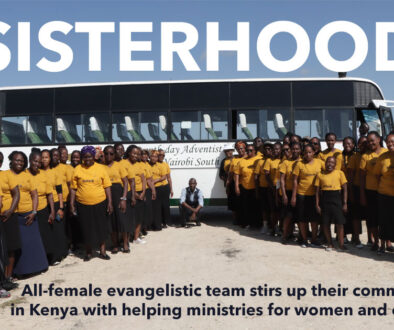December 13 Offering Earmarked for the Adventist Charity
By AT News Team, Dec. 10, 2014: One of only two times each year that Adventist churches take an offering for humanitarian charity is scheduled this coming Sabbath (December 13). In the United States the offering will go to Adventist Community Services (ACS) the domestic community action agency of the denomination. In Canada and the rest of the world ….. more about that below.
ACS is one of the best-kept secrets among Adventists primarily because of something called “Dorcas.” When that word is used among middle-aged and older Adventists they typically stop listening, stop reading and continue in ignorance of today’s reality. The Dorcas Society was the earliest form of social work among Adventists, dating to the 19th century. It was actually invented by the Wesleyan movement and because a number of early Adventist leaders had previously been Methodists, the concept was brought over into the new denomination.
The Dorcas Society was a volunteer program largely staffed by women that functioned primarily to share in-kind donations with local families in need. At the end of World War II in the late 1940s and 1950s the Dorcas Society was renamed Seventh-day Adventist Welfare Services (SAWS) and focused on packing used clothing and other donated goods for shipment to devastated countries in Europe and later the post-colonial, underdeveloped nations of Africa and Asia.
SAWS was merged with other Adventist activities in the 1970s and eventually re-named the Adventist Development and Relief Agency (ADRA). In this process it was disconnected from the domestic activities in North America.
Today there are 250 to 500 local centers in the United States that provide emergency food, recycled clothing and household goods, health screening and other human services that make up the bulk of ACS programs. About 30 of these have hired a full-time professional as director and operate on a daily basis. Examples of these highly-developed ACS agencies include Good Neighbor House in Dayton (Ohio), Good Samaritan Center in Chattanooga (Tennessee), Portland (Oregon) ACS known locally as PACS, and ACS of Greater Washington (DC).
ACS plays a key role in disaster response under contracts with the Federal Emergency Management Agency (FEMA) in the U.S., the American Red Cross and several other organizations. These contracts commit Adventists to mobilize a response when a disaster is declared by the president or a state governor and specify the nature of the activities.
ACS operates a number of less well-known programs, including a tutoring and mentoring program for underprivileged children in collaboration with AmeriCorps and America Reads, a youth service program, elder care and crisis care programs. The ACS Web site includes a list of 34 affiliated senior living facilities.
The offering this weekend will go largely to the ACS Community Development Program which started life in 1967 when the denomination’s General Conference executive committee set up the Inner City Program. This program was merged with ACS in the 1990s and was, in fact, never limited to urban neighborhoods. ACS recently announced a new grant program for local projects submitted by congregations and affiliated groups.
The most recent data available is more than a decade old, but in the early 2000s ACS programs were reaching more than 1.3 million people through 362 local units; raising a total of $15.6 million a year, about $6 million in cash, $7.6 million in donated food and $1.9 million in donated clothing, furniture, etc. ACS is incorporated as a nonprofit organization separately from the denomination itself, but under the control of the denomination’s North American Division (NAD). It has the legal status of a public charity under section 501(c)3 of the Federal tax law and receives significant donations and grants from individuals and groups not part of the Adventist denomination. Its board includes seven officers of the NAD, the ACS executive director, three local conference ACS directors and a representative from the denomination’s General Conference.
In Bermuda ACS operates in much the same way and has negotiated a recognized role with the government of this British colony. In Canada, ACS does not exist as a separate entity or program and the activities of ACS and ADRA have been merged under ADRA Canada. The relationship between local community services and ADRA are “complicated” in the rest of the world.
This offering is collected in the NAD. In the rest of the world there are typically two annual giving opportunities that both go to ADRA, although this is a relatively new concept in many of the developing nations of the southern hemisphere and still not implemented everywhere. More information and a place to make a donation with a credit card are available on the Web here: www.communityservices.org



